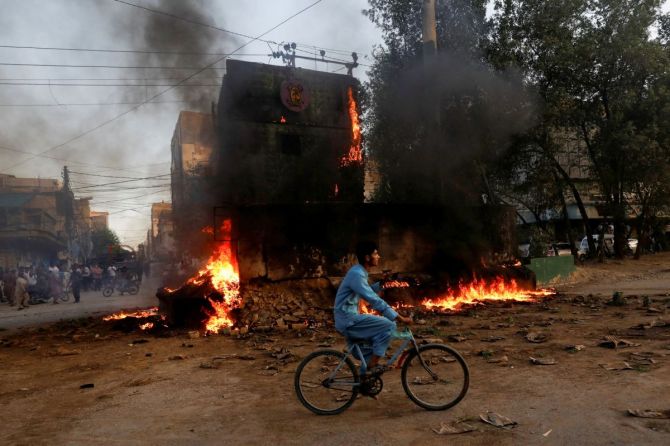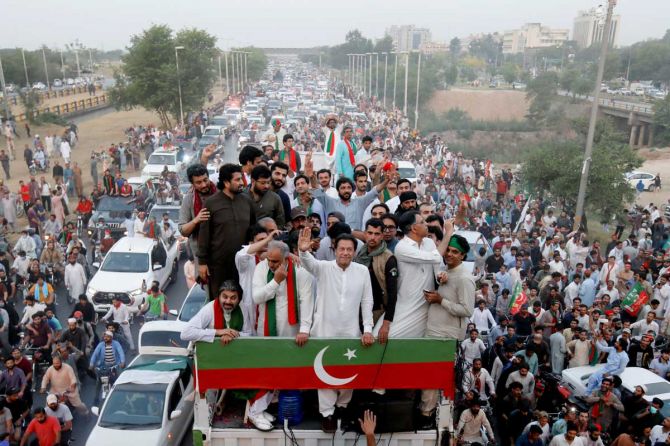'Pakistan is a nuclear country.'
'With the kind of situation that is there in Pakistan today, America will help Pakistan stay afloat.'

"Imran Khan is gaining popularity because he remains uncompromising and continues to be critical of America as also the army," Avinash Mohananey, the retired Intelligence Bureau officer who spent a considerable time in Pakistan on security assignments, tells Prasanna D Zore/Rediff.com.
Why is the IMF deal so crucial for Pakistan as well as the Shehbaz Sharif government?
This is crucial because their balance of payments situation is becoming precarious.
What it expected from the Chinese leadership was that the repayment schedule of Chinese loans could be deferred by five years.
What is the quantum of this loan from China?
The loan is large, but in the next five years, Pakistan will have to pay about $15.5 billion to China.
What's the size of this IMF deal and what are the Chinese offering to the Pakistanis?
It's (the IMF deal) about $7 billion spread over two years or so given at a very soft interest rate.
The IMF also wants that Pakistan should use its influence with the Chinese so that the money that the IMF is providing to Pakistan is not headed over to the Chinese as debt repayment. Now, the problem is that China is not willing to defer these loans.
It rather suggested that a CPEC 2.0 (the plan that envisages rapid industrialisation and job creation in Pakistan by 2025) kind of version of the CPEC (the China-Pakistan Economic Corridor, a multi-billion dollar infrastructure project which envisages road and sea linkages between the two countries) can be brought in to help Pakistan rev up its flailing economy.
China was ready to invest but then they laid conditions that the security has to be foolproof.
Given the situation today, given the economic constraints that Pakistan is facing, do you see an economic collapse happening in Pakistan if both the IMF and China don't budge from their positions?
The Americans would never like Pakistan to go down the drain.
One has to realise that Pakistan is a nuclear country. With the kind of situation that is there in Pakistan today, they (America) will help Pakistan stay afloat and always step in to act whenever required.
The Pakistani establishment -- the top generals in the army and Pakistan's ruling elite -- knows for sure that the Americans have always bailed them out at the last moment.
But Imran Khan has steadfastly refused to play ball with the Americans. That is why the US is pushing Imran Khan towards the wall. And that is why they are not inclined to compromise with Imran Khan and Imran Khan is also not ready to compromise with the army.
How do you see this stalemate progressing further?
Right now, the confrontation will continue if the army is unable to control the judicial pronouncements. As of now, the army has not been able to do so. But if it continues like that, then we can hear the sounds of boots coming.
The Shehbaz Sharif governent plans to move a petition in the supreme sourt asking for a ban on Imran Khan's political party, the Pakistan Tehreek-e-Insaf. Will the supreme court play ball?
Given the precarious relationship between the judiciary, the executive and the army, I don't think that anybody in Pakistan is giving any chance of the supreme court agreeing to second or approve the proposal to ban the PTI. Nobody is giving any chance to this to succeed.

What makes it possible for Imran Khan to defy the Pakistan army and even take on the US?
The Pakistan army is right now the most powerful institution in that country. But it is under pressure from the insurgents in Khyber-Pakhtunkhwa and Balochistan. They are losing a lot of men there. They are fighting a battle with terror groups like the Pakistan Taliban.
Secondly, the army is not very popular in Pakistan because of its past interference (in domestic politics) and the lavish lifestyle that Pakistani generals have been living. The kind of properties, real estate and wealth they have amassed over time is unbelievable.
Pakistanis also abhor US interference in Pakistan's domestic and foreign policy.
Imran Khan is exploiting anti-army and anti-US sentiments to establish himself as that country's most powerful political leader and he is getting widespread support among the people.
Imran Khan is gaining popularity because he remains uncompromising and continues to be critical of America as also the army.
Imran Khan, on his own, is a complete autocrat. But right now he's the most popular.
Given that the economic condition in Pakistan is so precarious people don't like whoever is in power. The Pakistan Muslim League (Nawaz) has become very unpopular in its heart -- the Punjab. Imran Khan knows it well.
He knows that if elections are held today, he can win an overwhelming majority across Pakistan hands down.
It is a different thing that when he was in power the last time, he became unpopular because of the price rise, the joblessness, the anger of people over ever-increasing electricity and fuel bills.
Given this situation it is being believed that the next budget in that country will be dictated by the IMF. This will further burden the people because he IMF always dictates pruning of government subsidies on utility bills, oil and gas, and agriculture produce. The anger would be against the army as also the Pakistan Muslim League (Nawaz).
Why does the judiciary in Pakistan favour Imran Khan's PTI? At least on the face of it, it looks like that.
I absolutely agree.
Right now the judiciary is coming out from the pressure that it had faced earlier from the ISI (Inter-Services Intelligence) and other army organisations. If you recall, this year six Islamabad high court judges had written to the chief justice of Pakistan that they were getting threatening calls from the intelligence agencies and which they wanted to discuss. That was an open letter. It (the matter) is still (pending) with the supreme court.
The government had decided to form a judicial commission to probe these charges but the justice who was appointed refused to head the commission.
Everybody knows that it is very common in Pakistan that the intelligence agencies have been interfering in the judgments that the courts deliver. But since now they have some support from the supreme court the other judges are also refusing to listen to the dictates of the ISI.











 © 2025
© 2025